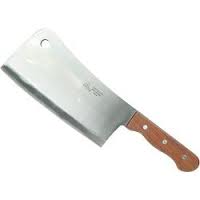by Christopher Perrin, PhD | Feb 20, 2013 | Uncategorized
Sequestration–The Latin Word De Jour

For the last few months we have been hearing a good bit about the threat of a looming sequestration that both political parties formerly approved but presently fear. President Obama has just referred to sequestration as a meat cleaver, that no one should wield. What is this dreaded sequestration? And more importantly for readers of this blog—what is its Latin roots?
Let’s start with the Latin. The Latin word sequestrum means a deposit, and the word sequester (a noun) means either a depositary or the person (a trustee) who holds a deposit between two parties in dispute, until the dispute is settled. Finally there is a late Latin verb sequestare, which means to put in the hands of a trustee or into a depositary.
So that’s the Latin. Now we can see how our English words came about… Our word sequester is a verb, though it is spelled exactly like the Latin noun. Our English verb sequester has a few connotations:
- To “deposit” yourself or another to a place of peace and solitude. Monks, for example, lead a sequestered life.
- To simply withdraw or separate as in the sentence, He sequestered himself from the rest of the party and went downstairs to the basement alone.
- In legal matters, it can mean that we “withdraw” or “separate” someone’s property or money for a period of time, often until legal claims are satisfied.
In our current political and economic debate, we are using the words sequester and sequestration in sense 3, above. Congress previously passed a bill that specified that huge sums of money (that normally would be spent) would be sequestered (held in “deposit”or “cut”) and not be spent. ABC news describes it this way: “The dreaded “sequester” amounts to across-the-board budget cuts that will strike in March barring an agreement on deficit reduction.” This form of sequestration is practically speaking a spending freeze – a freeze that is binding until congress passes a budget. Once congress passes a budget, the legal issue will be satisfied and the sequestration (spending freeze) will be lifted—the sequestration will be sequestered.
My prediction: a budget will be passed (even if after a short period in which sequestration kicks in). Neither party wants sequestration, but both will play the issue to their best advantage during another stretch of political theater. While this lamentable, we do get to play with words and learn some Latin.
by Christopher Perrin, PhD | Feb 19, 2013 | Articles
 The world begins at a kitchen table. No matter what, we must eat to live. / The gifts of earth are brought and prepared, set on the table. So it has been since creation, and it will go on. /We chase chickens or dogs away from it. Babies teethe at the corners. They scrape their knees under it. /It is here that children are given instructions on what it means to be human. We make men at it, we make women.
The world begins at a kitchen table. No matter what, we must eat to live. / The gifts of earth are brought and prepared, set on the table. So it has been since creation, and it will go on. /We chase chickens or dogs away from it. Babies teethe at the corners. They scrape their knees under it. /It is here that children are given instructions on what it means to be human. We make men at it, we make women.
–Joy Harjo, Perhaps the World Ends Here
Good educators know the importance of finding time to slow down and contemplate important truths in order to know them, and to some degree to possess them. Parents (and parent educators) also know that reflection and good conversation are critical to raising our kids well. The opportunity for good conversation should come to us daily–at the table. Is you table still the center of your home? I would love to hear how.
We rush in and we rush out. Running a household is quite a challenge, certainly as challenging as running a small business. The metaphor seems appropriate—in many ways our households resemble a business. We have budgets and inventory to manage, supplies to purchase and repairs to make. We are busy with our family business. But we all must stop to eat, and we eat at a table.
Ah, if it weren’t for our need for food, would we even slow down? But food will slow us down, even the aroma of a casserole in the oven or a steak on the grill will give us pause. The good smells, the chatter in the kitchen, the clink of plates and glasses placed on the table, they pull on each member of the family until we arrive together at one place, the table. We are hungry after all, we are human.
As the poem by Joy Harjo makes plain, we gather at the table not only to eat and live. We gather among gifts brought and prepared. At the table we acknowledge our daily need, met by the gift of our benevolent God, and we learn to thank him, faced squarely with the reality that he feeds us or we die. We learn to thank the graciousness and care of the cook who brings the food and those who set the table and who clean up. At the table we stop for a while and talk, listen, laugh and sometimes cry. Are we not civilized at the table? Isn’t it there that we learn to wait and share, to listen and pray? Are not problems solved there, our dreams for the future schemed and laid bare? Could we not say that the table is our first school of Christian discipleship? It is not there that our fathers read from the Scripture, there that we sing and pray, and there that we are instructed?
Some of us eat alone. There are practices, soccer games, rehearsals and music lessons. There are church meetings, book groups and Bible studies. Dinner is in the fridge, you can warm it up when you get home. The family should be able to eat together on Friday night, unless you have to work late again.
Jesus ordained a sacrament at a table, telling his church to eat and “do this in remembrance of me.” We meet Christ as a community at his table, when we celebrate the Lord’s Supper. Can we not remember him and each other at our own table and in a profound way make it also his? Dinner is waiting and no matter what we must eat to live.









